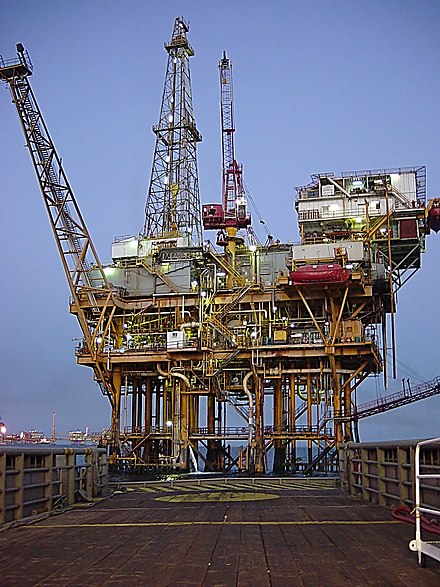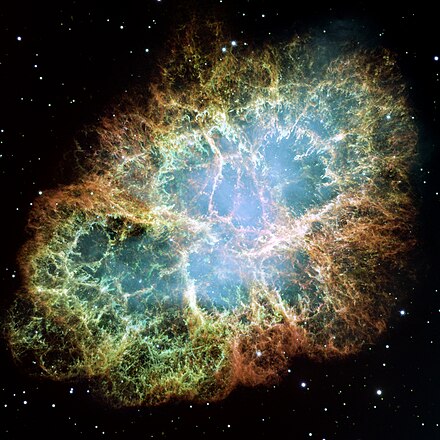Portal:Energy
| Main page | New articles & Tasks |
 The Energy Portal Welcome to Wikipedia's Energy portal, your gateway to energy. This portal is aimed at giving you access to all energy related topics in all of its forms.
|
Page contents: Selected article • Selected image • Selected biography • Did you know? • General images • Quotations • Related portals • Wikiprojects • Major topics • Categories • Help • Associated Wikimedia |
Introduction
In physics, energy (from Ancient Greek ἐνέργεια (enérgeia) 'activity') is the quantitative property that is transferred to a body or to a physical system, recognizable in the performance of work and in the form of heat and light. Energy is a conserved quantity—the law of conservation of energy states that energy can be converted in form, but not created or destroyed. The unit of measurement for energy in the International System of Units (SI) is the joule (J).
Common forms of energy include the kinetic energy of a moving object, the potential energy stored by an object (for instance due to its position in a field), the elastic energy stored in a solid object, chemical energy associated with chemical reactions, the radiant energy carried by electromagnetic radiation, and the internal energy contained within a thermodynamic system. All living organisms constantly take in and release energy.
Due to mass–energy equivalence, any object that has mass when stationary (called rest mass) also has an equivalent amount of energy whose form is called rest energy, and any additional energy (of any form) acquired by the object above that rest energy will increase the object's total mass just as it increases its total energy.
Human civilization requires energy to function, which it gets from energy resources such as fossil fuels, nuclear fuel, or renewable energy. The Earth's climate and ecosystems processes are driven by the energy the planet receives from the Sun (although a small amount is also contributed by geothermal energy). (Full article...)
Selected article
Acceptance of peak oil is far from universal, and the only reliable way to identify its existence will be in retrospect. One alternative scenario is that global production will eventually follow an 'undulating plateau' for one or more decades before declining slowly.
Having accurately predicted the date of peak production in the US petroleum industry, which occurred in 1970, M. King Hubbert, who devised the theory, forecast that the world peak would occur in 1995 'if current trends continue'. Various subsequent predictions have been made as trends have fluctuated in the intervening years. Two milestones have passed, however. The peak of world oilfield discoveries occurred in 1965 and, due world population growth, production per capita peaked in 1979.
The effects of peak oil could be mitigated through conservation and switching to alternative fuels or unconventional oil sources. Such changes would bring their own challenges, ranging from the need to development alternative technologies to potential increases in greenhouse gas emissions.
Selected image

Photo credit: From an image by Wolfgang Beyer
Strombolian volcanic eruptions can eject incandescent cinder, lapilli and lava bombs to altitudes of tens to hundreds of meters.
Did you know?

- The Power of Community: How Cuba Survived Peak Oil is a documentary film which details Cuba's efforts to recover from the 1990s economic crisis known as the Special Period?
- The Geysers (pictured), north of San Francisco, California, is the largest geothermal power development in the world?
- The International Energy Agency was founded in 1974 by the Organisation for Economic Co-operation and Development (OECD) in the wake of the 1973 oil crisis?
- Indian Railways has started to use Jatropha oil, blended with diesel fuel in various ratios, to power its Diesel locomotives?
- The South Wales Gas Pipeline is the largest high pressure gas pipeline in the United Kingdom?
- The Presbyterian Church (USA) was the first major religious denomination in the world to call on its followers to become carbon neutral?
- There was partial meltdown at the Three Mile Island nuclear power plant in 1979?
- A hybrid electric vehicle achieves better fuel economy than a conventional vehicle without being hampered by the limited range of an electric vehicle?
Selected biography
In recognition of Watt's achievements, the SI unit of power, the watt, is named after him.
James Watt was born on 19th of January, 1736 in Greenock, a seaport on the Firth of Clyde. His father was a shipwright, shipowner and contractor, while his mother, Agnes Muirhead, came from a distinguished family and was well-educated. Both were Presbyterians and strong Covenanters. Watt attended school irregularly and instead was mostly schooled at home by his mother.
After studying instrument-making for a year in London, the University of Glasgow offered him the opportunity to set up a small workshop within the university. It was established in 1757. After four years, Watt began to experiment with steam, finally producing a working model steam engine in 1765. Strapped for resources to develop a full-scale engine, Watt was forced to take up employment as a surveyor for eight years. Finally, in 1776, the first engines were installed and working in commercial enterprises.
After further improvements, Watt and foundry owner Matthew Boulton established Boulton and Watt in 1794 to exclusively manufacture steam engines. By 1824 it had produced 1,164 steam engines having a total nominal horsepower of about 26,000.
General images
The time allocated for running scripts has expired.
The time allocated for running scripts has expired. The time allocated for running scripts has expired.
The time allocated for running scripts has expired. The time allocated for running scripts has expired.
The time allocated for running scripts has expired.
WikiProjects connected with energy:
Other WikiProjects that may be of interest:
The time allocated for running scripts has expired.
The time allocated for running scripts has expired.
National energy supply, use & conservation
National electricity sector
Politics, economics, environment
- Climate change
- Energy conservation
- Energy economics
- Energy crises
- Energy development
- Energy policy
- Peak oil
Energy sources
- Fuels
- Biofuels
- Fossil fuels
- Fusion power
- Nuclear technology
- Renewable energy
- Energy conversion
- Electric power
- Energy storage
Energy-related design
Scientific usage
The time allocated for running scripts has expired.

Puzzled by energy?
Can't answer your question?
Don't understand the answer?
- Ask at the reference desk
- Read the Wikipedia help pages
For further ideas, to leave a comment, or to learn how you can help improve and update this portal, see the talk page.
The time allocated for running scripts has expired.
The following Wikimedia Foundation sister projects provide more on this subject:
-
Commons
Free media repository -
Wikibooks
Free textbooks and manuals -
Wikidata
Free knowledge base -
Wikinews
Free-content news -
Wikiquote
Collection of quotations -
Wikisource
Free-content library -
Wikiversity
Free learning tools -
Wiktionary
Dictionary and thesaurus
.jpg/440px-Energy_Arc_(central_electrode_of_a_Plasma_Lamp).jpg)










































